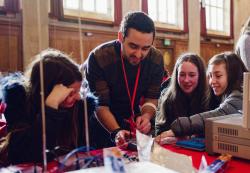Newsletters
Royal Academy grant for the ‘Photo-Electric Light Orchestra’
An innovative outreach project delivered by Bangor University’s School of Computer Science and Electronic Engineering in partnership with the University’s Widening Access Centre has secured a £30,000 grant from the Royal Academy of Engineering as part of its Ingenious scheme – a programme that seeks to engage the public with engineering.
The ‘Photo-Electric Light Orchestra’ project will inspire children aged between 9-13 in the region to design their own musical instruments by implementing coding skills and by utilising photonics, the study of light in technology, to create a music score that will be performed at Pontio, the University’s Arts and Innovation Centre at the final stage of the project in 2020. Dr Daniel Roberts leading an outreach workshop
Dr Daniel Roberts leading an outreach workshop
Led by Dr Daniel Roberts, a Coleg Cymraeg Cenedlaethol Lecturer in Electronic Engineering at the School, the project will be delivered to pupils from 8 mainstream and special schools in the region and will consist in the first stage of teaching coding skills in order to design and 3D-print innovative musical instruments. Then, by using the power of light by means of lasers or LEDs, musical notes will be produced that will ultimately be added to the composition of the ‘orchestra’ and its unique score.
The project will be launched on the University’s stall at the National Eisteddfod in August, before commencing in earnest at the start of the new school year in September, with those taking part being invited to the School of Computer Science and Electronic Engineering for a day’s coding and photonics workshops.
The Royal Academy of Engineering’s Ingenious project has funded over 200 projects to date, providing opportunities for close to 6,000 engineers to take part in public engagement activities, to gain skills in communication and to help bring engineering to the very centre of society.
Reacting to the news of the grant award, Dr Roberts said:
“This is an amazing opportunity to work collaboratively with the Widening Access Centre to not only work with children from the local area, and engage with STEM activities, but also with engineers, some of whom are just starting out in their careers, who will gain invaluable experience by working with children from local communities and engaging more young people in STEM-related subjects. My day job is lecturing and laboratory demonstrating, so being able to go out into the community and deliver STEM workshops and encourage young people to continue in the field of STEM, is very rewarding. Yes, it's a cliché, but there weren’t any opportunities like this when I was in school, so to be able to be a part of delivering these kinds of activities makes it all incredibly worthwhile.”
This was echoed by Delyth Murphy, Head of the University’s Widening Access Centre, who said:
“An important part of the Widening Access Centre’s role is to facilitate outreach work alongside the University’s academic staff. This project provides a new opportunity to introduce postgraduate students in Electronic Engineering and Music to such outreach activities in 8 schools, including two Special Educational Needs schools, in the Gwynedd area.”
Publication date: 16 April 2019
